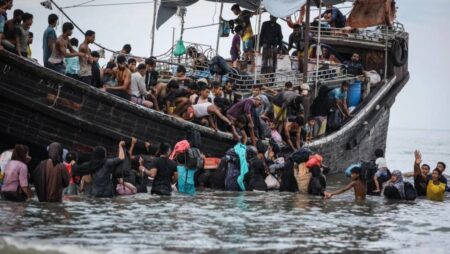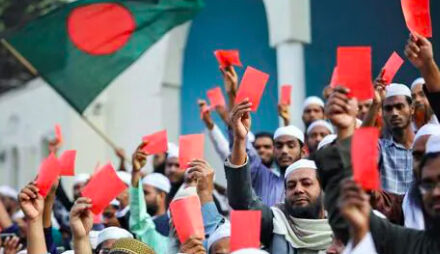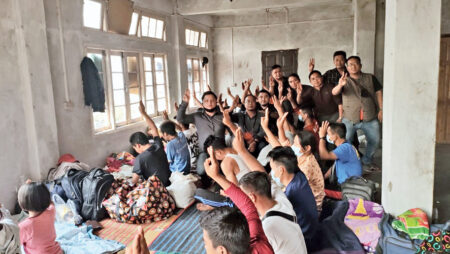MANTRAYA ANALYSIS#63: 14 FEBRUARY 2023
Preparing for a Fraudulent Election: Myanmar Military attempts to Legitimize the Coup
BIBHU PRASAD ROUTRAY
ABSTRACT
Myanmar’s military junta is preparing for holding an election in 2023 in order to provide the much-needed legitimacy to its rule. It is most likely to be a sham exercise, the UN has speculated. At the same time, the junta’s military actions continue to play havoc in the country. The armed resistance against the junta too has picked up momentum, thereby unveiling a civil war situation in vast stretches of the country. Irrespective of whether the Tatmadaw manages to hold the elections or not, Myanmar could well be staring at a bloody 2023, with mounting human costs.

in Naypyidaw on 27 March 2019. Photo Courtesy: Asia Times)
Introduction
Amid continuing turmoil brought about by a civil war situation, Myanmar’s military (Tatmadaw) is busy preparing for holding the parliamentary and provincial elections in August 2023. Its appointed officials are touring civilian homes to prepare a voters list. On 9 February, the Union Election Commission (UEC) provided a live demonstration of the new Myanmar Electronic Voting Machine (MEVM) to the Tatmadaw chief Min Aung Hlaing and his fellow generals. The EVMs are speculated to have been provided by India, which is helping the Junta to conduct the elections. Although recurrent violence orchestrated by the People’s Defence Forces (PDFs) of the parallel National Unity Government (NUG) remains a considerable challenge to be overcome by the Tatmadaw, the latter in all likelihood to go ahead with the elections to cement its position.
A Sham Exercise
The military’s Union Solidarity and Development Party (USDP) was decisively defeated by the NLD in the 2015 and 2020 elections. The NLD had gathered 80 percent of the popular votes in the 2020 elections. However, the Tatmadaw has rolled out a roadmap to ensure that the USDP can be the only winner in the 2023 elections.
Firstly, it has sought to make the NLD politically irrelevant, by arresting, prosecuting, and sentencing thousands of its members, including Suu Kyi. Secondly, it is trying to radically transform the political landscape in the country and has unveiled rules aimed to restore a political system it can control. The 2008 constitution allowed the military an upper hand in the administration but wasn’t enough to prevent the victory of mass-based parties like the NLD. The rules unveiled for the 2023 elections are intended for that. A proportional representation system has been unveiled, whose details are yet to be notified. More importantly, according to the new rule by the UEC, parties intending to compete nationally must have at least 100,000 members. The required numbers were only 1,000 previously. In addition, they must commit to running in the election in the next 60 days or be de-registered as a party.[1] This clearly favours the USDP, as the NUG has dismissed the prospect of participating in the elections.
The proposed elections are, therefore, not just an attempt to hold on to power by the Tatmadaw, amid phenomenal political and social shifts which the country has undergone in the past two years, these are tools to reimpose military dominance on the people of Myanmar, who had embraced democracy for the past decade. Therefore, notwithstanding the support the Tatmadaw’s State Administration Council (SAC) may have received domestically as well as in a handful of countries, it continues to receive regular flak for its attempt to undermine democracy through brutal oppression. On the eve of the second anniversary of the military coup, UN Special Rapporteur on the situation of Human Rights in Myanmar Tom Andrews issued a new report[2]. He said, “The conclusion is clear – the SAC’s military coup was illegal and its claim as Myanmar’s government is illegitimate and a new, coordinated international response to the crisis is imperative.”[3]
Normalcy versus Turmoil
The statistics recount a funereal reality. Two years since the coup, close to 3000 people have been killed (till 13 February 2023) during the junta’s crackdown on pro-democracy activists, according to the monitoring group, the Assistance Association for Political Prisoners.[4] A total of 19018 people have been arrested, out of which 15117 are still detained or have been sentenced. Through its courts, the military has not just inflicted prolonged prison sentences on former state counsellor Aung San Suu Kyi, other politicians, and dissenters, it has also executed four prominent pro-democracy activists including a former member of parliament in July 2022[5], in complete disregard to international opinion.
And yet, there is little prospect of the military eliminating its adversaries whom it repeatedly describes as ‘terrorists’. The opposition under the NUG, which started its campaign to restore democracy by peaceful means, now predominantly relies on armed attacks on the military and people associated with it, thereby reducing vast areas in central and peripheral Myanmar such as the Sagaing, Mandalay, and Magwe regions, Shan, Kachin, Karen, and Rakhine states to war zones. The NUG has gradually managed to emerge as the umbrella organisation of all the dissenting PDFs and the Ethnic Armed Organisation (EAOs).
Disposition to extend the boundaries of brutality in its bid to ‘pacify’ the ‘disturbed areas’ is the striking feature of the campaign led by the Tatmadaw. Aerial attacks, allegedly using Russia-provided choppers and planes[6], have claimed hundreds of innocent victims and led to the wanton destruction of civilian properties. Reminiscent of the scorched earth policy pursued against the ethnic armed organisations in the past decades, its violent campaign has further led to a one-and-a-half million internally displaced population. Around 40,000 homes have been burned down and eight million children no longer have access to schools. According to the UN, 15 million people are precariously short of food.[7]
The World Bank has predicted Myanmar’s economy to grow at only 3 percent[8], at the same rate it performed in 2022. The level of economic activity is still over 10 percent below where it stood before the pandemic and the military takeover. An array of sanctions imposed by countries like the US, UK, Canada, and Australia may have partially hurt the Tatmadaw’s business interests, although by no means has crippled it.
However, Tatmadaw still tries to project a state of normalcy, by trying to conduct its affairs in an unfazed manner. Domestically, Tatmadaw attempts to divide the opposition by seeking the loyalty of some of the ethnic groups, extreme Buddhist associations like Ma Ba Tha, and former NLD politicians have continued and may have partly succeeded.
A large part of this is due to its conviction of invincibility. It clearly outnumbers and outguns its opponents. Further, it continues to receive military as well as economic assistance from countries like China and Russia. In addition, it is home-producing a vast range of weapons to use against its own people with supplies from companies in at least 13 countries including the US, France, India, and Japan, according to a report.[9] Some of the equipment used to make weapons is believed to come from Austria. Taiwan’s GFM Steyr technicians maintain the machines that are used for arms manufacturing.[10]
And yet, a sense of unease is evident in the power corridors of the Tatmadaw. It had hoped to overpower its opponents quickly. That has not happened. The PDFs have grown in numbers and their capacity to inflict casualties on the military too has grown steadily. Several EAOs, who are part of the NUG’s efforts, on the other hand, have kept the Tatmadaw busy on the borderlands. In a desperate measure, the Tatmadaw has raised a militia to take on the PDFs and the EAOs. Reportedly, it is also seeking to provide weapons to the civilians ‘who agree to participate in local security and law enforcement in their states and regions’.[11]
While it continues its armed assault on the PDFs and the EAOs, the Tatmadaw reckons the need to legitimize the incessant use of force. It hopes that the elections and heralding of a new government may put a halt to the civil war. If not, it will at least provide a stamp of legitimacy to its oppression that is currently attracting international censuring.
The Road Ahead
There is no meeting ground between the military and the opposition NUG. Full restoration of democracy has been the latter’s demand so far. Even though the military has admitted to having been caught by surprise by the nature and scale of resistance, it has steadfastly refused to negotiate with its opponents, as it promised to do in a meeting with neighbouring countries shortly after the coup. This is a recipe for long-term instability.
Proportionality of capacity among conflicting parties could prolong the civil war situation. The PDFs have managed to vastly upgrade their war-fighting capacities over the months. Their guerrilla urban war techniques and insertion of drones into their armory make them worthy opponents of the military. This could make the military’s efforts against the opposition much more brutal, without producing the desired results. Its capacity to hold the elections in 2023 looks doubtful, as the PDFs continue to systematically attack and assassinate officials associated with the preparation of elections.
At the same time, unity of effort and a common vision for an end game in Myanmar are the missing elements in the divided stance of the regional countries as well as the international community including the UN. That makes the punitive sanctions imposed by individual countries on the Tatmadaw functionaries rather less impactful and liable to be circumvented. In contrast to the Chinese and Russian strategic backing of the Tatmadaw, the West and the UN’s move on Myanmar has largely continued to remain normative and hence, lack teeth. Unlike the ongoing Ukraine war, there is no overt measure to augment the fighting capacity of the opposition in the country. The PDFs appear to be receiving some covert military assistance from unknown sources. That has increased their fighting capacities but isn’t enough to pressurise the Tatmadaw significantly. In December 2022, US President Joe Biden signed the National Defense Authorization Act (NDAA), which includes the Burma Act.[12] The Act allows the US government to spend US$50 million annually from 2023 to 2027. Another US$220 million is budgeted for humanitarian aid to Myanmar for the 2023 fiscal year. That, however, is unlikely to decisively shift the stalemate in favour of the opposition, and may even lead to competitive assistance to the Tatmadaw from its allied countries.
Irrespective of whether the Tatmadaw manages to hold the elections or not, Myanmar could well be staring at a bloody 2023, with mounting human costs.
END NOTES
[1] “Myanmar army set to cement rule with tough new election criteria”, Reuters, 27 January 2023, https://www.reuters.com/world/asia-pacific/myanmar-army-set-cement-rule-with-tough-new-election-rules-2023-01-27/.
[2] United Nations Human Rights Special Procedures, Illegal and Illegitimate: Examining the Myanmar military’s claim as the Government of Myanmar and the international response, 27 January 2023, https://www.ohchr.org/sites/default/files/documents/countries/mm/2023-01-27/crp-sr-myanmar-2023-01-31.pdf.
[3] United Nations Human Rights Office of the High Commissioner, Myanmar: UN expert’s report highlights junta’s fraudulent claim to legitimacy, urges States to denounce 2023 ‘sham’ elections, 31 January 2023, https://www.ohchr.org/en/press-releases/2023/01/myanmar-un-experts-report-highlights-juntas-fraudulent-claim-legitimacy.
[4] Assistance Association for Political Prisoners, https://aappb.org/.
[5] “Myanmar: Military executes four democracy activists including ex-MP”, BBC, 25 July 2022, https://www.bbc.com/news/world-asia-62287815.
[6] Ingyin Naing, “Rights Group Alleges Russia Supplied Weapons Used in Airstrike on Myanmar School”, Voice of America, 1 December 2022, https://www.voanews.com/a/rights-group-alleges-russia-supplied-weapons-used-in-airstrike-on-myanmar-school/6858693.html.
[7] UN Office for the Coordination of Humanitarian Affairs, “Myanmar Humanitarian Needs Overview 2022”, 31 December 2021, https://reliefweb.int/report/myanmar/myanmar-humanitarian-needs-overview-2022-december-2021.
[8] The World Bank, “Uncertainty weighs on Myanmar’s economy”, 30 January 2023, https://www.worldbank.org/en/news/press-release/2023/01/30/uncertainty-weighs-on-myanmar-s-economy.
[9] Special Advisory Council for Myanmar, “Fatal Business: Supplying the Myanmar Military’s Weapon Production”, https://specialadvisorycouncil.org/wp-content/uploads/2023/01/SAC-M-REPORT-Fatal-Business-ENGLISH-1.pdf.
[10] “Global firms help Myanmar’s military make weapons, says report”, BBC, 16 January 2023, https://www.bbc.com/news/world-asia-64250674.
[11] “Myanmar Regime Planning to Issue Weapons to Approved Civilians”, Irrawaddy, 11 February 2023, https://www.irrawaddy.com/news/burma/myanmar-regime-planning-to-issue-weapons-to-approved-civilians.html.
[12] “US’s Burma Act is an ‘Ultimatum’ to Myanmar Regime”, Irrawaddy, 20 December 2022, https://www.irrawaddy.com/in-person/interview/uss-burma-act-is-an-ultimatum-to-myanmar-regime.html.
(Dr. Bibhu Prasad Routray is Director of Mantraya. This analysis has been published as part of Mantraya’s ongoing “Fragility, Conflict, and Peace Building” project. All Mantraya publications are peer-reviewed.)
To read previous Mantraya Analyses CLICK HERE


